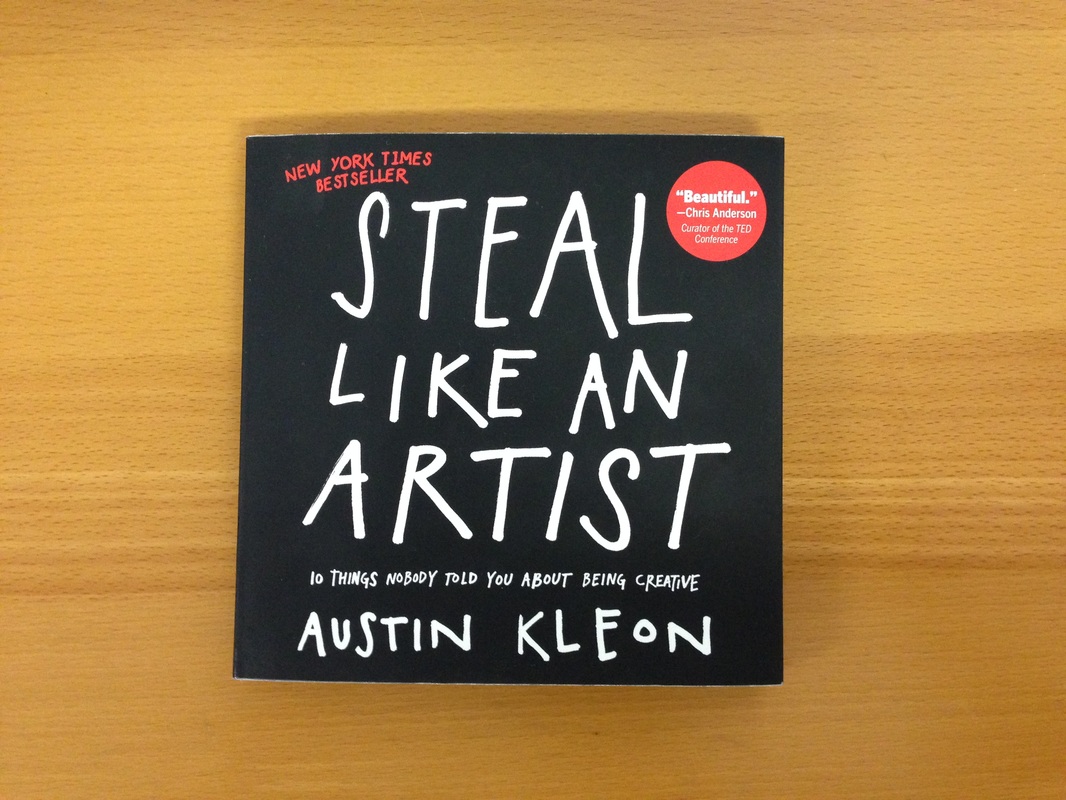|
I recently finished this book by Austin Kleon. This is a book about stealing influence from other people. It caused me to ask myself these two questions:
Continue reading to review all my dictated note and take-aways from each chapter. 1. Steal Like an Artist
When people give you advice, they're really just talking to themselves in the past. Nothing comes from nowhere. I'll creative work builds on what came before. Nothing is completely original. Every new idea is just a mash up or remix of one or more previous ideas. You are a sum of your influences. Study the work of artists you love. Find three people that that artist loved. Repeat this is many times as you can. Climb up the tree as far as you can go. Once you build your tree, it's time to start your own branch. Seeing yourself as part of a creative lineage will help you feel less alone as you start making your own stuff. 2. Don't wait until you know what you are to get started Imposter syndrome: psychological phenomenon in which people are unable to internalize their accomplishments. It means you feel like a phony, a fraud. Like they have no idea what they are doing. Actually, none of us know what we are doing. Ask anyone doing creative work, they have no idea where the good stuff comes from. They just show up and work. Pretend until you are. Start out as a phony and become real. All worlds a stage. Creative work as a kind of theater. The stage is your studio, your desk, or your workstation. The cost was your outfit, your painting pants, your business suit, or the funny hat that helps you think. The props are your materials, your tools, and your medium. The script is just plain old time. And our here, or an hour there--just time measured out for things to happen. In the beginning, we learn by pretending to be her heroes. We learn by copying. Plagiarism is trying to pass someone else's work off as your own. Copying is about reverse-engineering. It's like a mechanic taking apart a car to see how it works. First, if they figure out who to copy. Second you have to figure out what to copy. I'll just steal the style, still with thinking behind the style. You don't want to look like heroes, you want to see like your heroes. Wonderful for that human beings is that were incapable of making the perfect copies. Our failure to copy our heroes is where we discover where our own thing lives. That is how we evolve. 3. Write the book you want to read Draw the art you want to see, start the business you want to run, play the music you want to hear, write the books you want to read, build the products you want to use--do the work you want to see done. 4. Use your hands Bring analog tools back into your work, to make it fun, and to improve it Once you start your ideas, then you can move over to your digital station and use these computer to help you execute and publish them. When you lose steam, head back to the analog station and play 5. Side projects (are important) Practice productive procrastination. Take time to be bored. When you get busy you stupid. Creative people need time to sit around and do nothing. "Avoiding work is the way to focus the mind." - Maira Kalman You can't connect the dots looking forward, you can only connect them looking backwards - Steve Jobs 6. The secret: do good work and share it with people Do good work: I'm now you're going to suck for a while. Fail. Get better. Share it: put it on the Internet. Wonder at something. Invite others to wonder with you. Give your secrets away. When you open up your process and invite people in, you learn. You don't put yourself online because you have something to say - you out yourself online to find something to say. The Internet is a place to incubate ideas that aren't fully formed, a birthing center for developing work that you haven't started yet. 7. Geography is no longer our master Most of your mentors and peers don't live in your city. They live everywhere, you know them from the Internet. You can live anywhere and still connect with the world you want to be in. There's a community of people out there you can connect with. Travel makes the world look new, and when the world looks new, our brains work harder. 8. Be nice (The world is a small town) The best way to make friends on the Internet is to: say nice things about them. You're only as good as the people you surround yourself with. Follow people online who are: better and smarter than you. Find the most talented person in the room, if it's not you, go stand next to him. Hang out with him. Try to be helpful. If you ever find that you're the most talented person in the room, you need to find another room. "The way to get approval is to not need it." - Hugh MacLeod Really good work often appears to be effortless. Get comfortable with being misunderstood, disparaged, or ignored--the trick is to be too busy doing your work to care. 9. Be boring. It's the only way to get work done It takes a lot of energy to be creative, you don't have the energy if you waste it on other stuff. If you're lucky enough to make a living off doing what you truly love, it will probably take you a while to get to that point. Until then you need a day job. Stabley Shing in keeping a routine can be even more important than having a lot of time. Inertia is the death of creativity, you have to stay in the groove. The corollary to Parkinson's law is usually true: work gets done in the time available. The small details will help you remember the big details, keep a log book. 10. Creativity is subtraction In the age of information abundance and overload, those who get ahead will be the folks who figure out what to leave out, so they can concentrate on what's really important to them. Nothing is more paralyzing them the idea of limitless possibilities. The idea that you can do anything is absolutely terrifying. The way to get over create a block is to simply play some constraints on yourself. The right constraints can lead to your very best work. What we respond to in any work of art is the artist struggle against his or her limitations. It's often what an artist chooses to leave out that makes the art interesting. What isn't shown versus what is. You must embrace your limitations and keep moving. Creativity isn't just the things we choose to put in, it's the things we choose to leave out.
0 Comments
Leave a Reply. |
Paul Hill, Ph.D.I design, plan, and evaluate economic development programs for Utah State University. Archives
September 2022
Search this site:
|


 RSS Feed
RSS Feed
